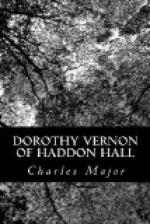“Madge, this is my cousin, Malcolm Vernon,” said Dorothy. “He was a dear friend of my childhood and is much beloved by my father. Lady Magdalene Stanley, cousin,” and she placed the girl’s soft white hand in mine. There was a peculiar hesitancy in the girl’s manner which puzzled me. She did not look at me when Dorothy placed her hand in mine, but kept her eyes cast down, the long, black lashes resting upon the fair curves of her cheek like a shadow on the snow. She murmured a salutation, and when I made a remark that called for a response, she lifted her eyes but seemed not to look at me. Unconsciously I turned my face toward Dorothy, who closed her eyes and formed with her lips the word “blind.”
I retained the girl’s hand, and she did not withdraw it. When I caught Dorothy’s unspoken word I led Lady Madge to a chair and asked if I might sit beside her.
“Certainly,” she answered smilingly; “you know I am blind, but I can hear and speak, and I enjoy having persons I like sit near me that I may touch them now and then while we talk. If I could only see!” she exclaimed. Still, there was no tone of complaint in her voice and very little even of regret. The girl’s eyes were of a deep blue and were entirely without scar or other evidence of blindness, except that they did not seem to see. I afterward learned that her affliction had come upon her as the result of illness when she was a child. She was niece to the Earl of Derby, and Dorothy’s mother had been her aunt. She owned a small estate and had lived at Haddon Hall five or six years because of the love that existed between her and Dorothy. A strong man instinctively longs to cherish that which needs his strength, and perhaps it was the girl’s helplessness that first appealed to me. Perhaps it was her rare, peculiar beauty, speaking eloquently of virtue such as I had never known, that touched me. I cannot say what the impelling cause was, but this I know: my heart went out in pity to her, and all that was good within me—good, which I had never before suspected—stirred in my soul, and my past life seemed black and barren beyond endurance. Even Dorothy’s marvellous beauty lacked the subtle quality which this simple blind girl possessed. The first step in regeneration is to see one’s faults; the second is to regret them; the third is to quit them. The first and second steps constitute repentance; the second and third regeneration. One hour within the radius of Madge Stanley’s influence brought me to repentance. But repentance is an everyday virtue. Should I ever achieve regeneration? That is one of the questions this history will answer. To me, Madge Stanley’s passive force was the strongest influence for good that had ever impinged on my life. With respect to her, morally, I was the iron, the seed, the cloud, and the rain, for she, acting unconsciously, moved me with neither knowledge nor volition on my part.
Soon after my arrival at the ladies’ parlor dinner was served, and after dinner a Persian merchant was ushered in, closely followed by his servants bearing bales of rare Eastern fabrics. A visit and a dinner at the inn were little events that made a break in the monotony of life at the Hall, and the ladies preferred to visit the merchant, who was stopping at The Peacock for a time, rather than to have him take his wares to Haddon.




